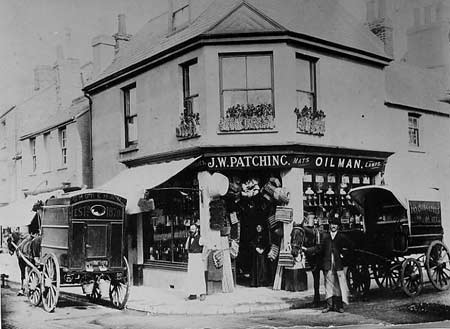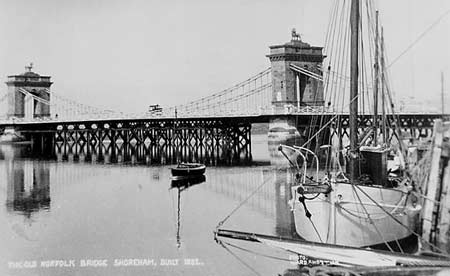|
First published West Sussex Gazette 28/1/93
Buoyant memories surfaced when Broadwater reader Arthur Pelling read last week's article about the Worthing Lifeboat. Arthur, who recalls visiting the Lifeboat house before the war when still a youngster, reminisced: 'Inside the boathouse was a stairway leading up to a gallery platform where we looked down on the massive-looking Lifeboat on its launching carriage.'
At that time the Lifeboat station was non-operational for it had ceased to be active in 1930 after Shoreham had been supplied with a motor Lifeboat, but the Victorian boathouse had been kept open as a showpiece museum raising funds for the RNLI.
Two of the former lifeboatmen, Arthur knew well -- Jack Keilly of Church Walk and Joe Street of Dagmar Street -- both fishermen, an interest shared by Arthur who has always felt a yearning for the sea, and is proud of maritime connections within his own family:
'One of my great uncles served in the Merchant Navy. Then there was Uncle Alfred (Pelling) who joined the Royal Navy in 1916 in the middle of the Great War shortly after his 16th birthday,' said Arthur, 'like so many others, he told the authorities he was 18 to get in, and went on to serve 27 years!'
Although Arthur lived in Worthing he spent a lot of time around relatives who lived and worked in the harbour town of Shoreham where his grandfather James Patching ran a hardware shop in the High Street. Founded by James in 1879, two of his sons, William and Edward, both worked in the business on paraffin rounds, delivering as far as West Portslade; each drove a horse-drawn van.
At the turn of the century, the shop, known as West End Oil Stores, also stocked provisions such as cheese, bacon and butter, and sold loose black treacle by the pennyworth to customers who took in their own jars; but the groceries were later discontinued and the hardware side of the business was expanded.

Shoreham's Victorian, High Street hardware shop -- West End Oil Stores on the corner of West Street -- pictured in the 1890s complete with bark-faced window boxes adorning the upstairs living quarters. On the pavement stands Mr James William Patching, founder of the business, while his wife stands back in the doorway, and son William holds a horse steady. Both horse-drawn vans parked outside delivered paraffin oil, candles and soap, etc on regular rounds.
|
The shop proved popular with its useful lines, including oil lamps and wicks, candles, coir (coconut fibre) matting, cleaning brushes and brooms, shopping baskets, galvanised baths and enamelled bowls, as well as mop heads and handles. Sisal clothes line was sold by the yard.
Brand names of soap powders such as Hudson's or Rinso will be familiar to some of you, whilst others may remember Lux Snowflakes or perhaps Lifebuoy and Dolphin bars of soap.
Truly a family-run business for in Edwardian times, other members of the family who worked in the shop included James' son William and two daughters Ellen and Thirza; the latter being Arthur's mother.
Grandfather Patching, who served 19 years as a Shoreham councillor, would say to young Arthur, 'Here you are me boy, here's some pennies, go and get yourself some sweets at Hyam's sweet shop in the High Street.'
And off Arthur would go to make his selection from aniseed balls, liquorice allsorts, gobstoppers, sherbert dabs, locust beans and tiger nuts. Still now and as clear as daylight, he can visualise his grandfather standing in the shop doorway, ticking off schoolboys throwing stones at Suter's boatyard opposite on the riverbank, and bellowing, 'If you don't behave yourselves the lion above the bridge will come down and gobble you up!'
In sight of and only a short distance away from the shop stood the original Norfolk Bridge spanning the River Adur, with two archways, one sporting a lion, the other a horse. It has been replaced twice since then: the first time in the 1920s when it was succeeded by an iron bridge, which itself was replaced by the present concrete construction during the last decade.

The original Norfolk bridge pictured here was opened in 1833 to carry the main coast road over the River Adur. Surmounting the two archways, carrying the chains upon which the bridge was suspended, were two figures, a lion and a horse, representing the crests of the noble Duke whose name it bore. It was replaced in 1923 by an iron cantilever type bridge, which in turn was demolished and the present road deck, opened in 1987, was laid on the existing supporting masonry.
|
Arthur recalls an old man whose regular resting place was a bench seat positioned at the eastern approach to the bridge -- his great uncle Harry Patching, who lived at 1, West Street next door to the shop.
James, the originator of the business, retired from the shop in the 1920s and went to live in an old converted railway carriage on Shoreham Beach, bought from Lancing Carriage Works and transported there.
Whimsically, Arthur recalled how stubborn a horse could be, 'When I was a lad of about 12, uncle Edward was still doing the paraffin delivery round and whenever he called on his sister in Church Street, the obstinate horse named Prince just would not go on until it had been fed either a carrot or some sugar knobs.'
Edward was a prominent member of the community, being active in the Shoreham branch of the British Legion as well as serving as a sergant in the Special Constabulary; and so his passing in the late 1950s was deeply felt by many.
It was then that Arthur himself went to work in the shop for Clare Patching, the widow, but when she died in the early 1960s, the shop closed.
| |


